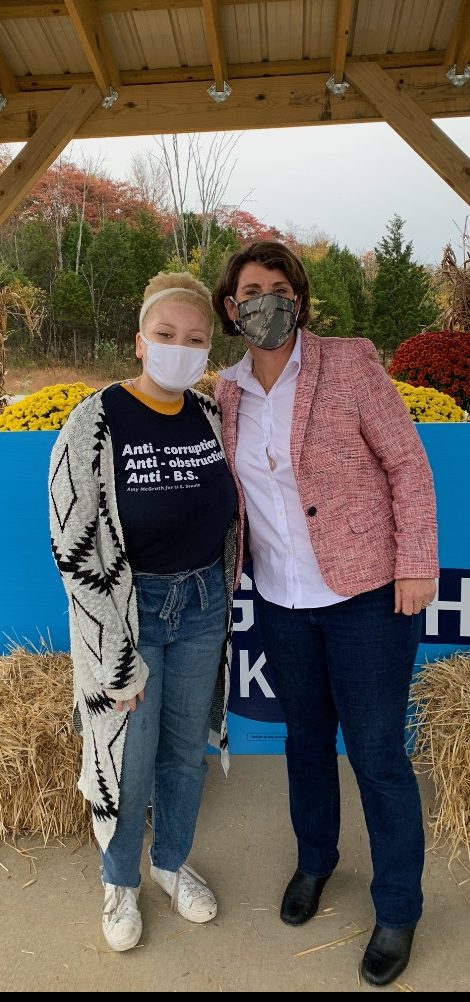
Courtesy of Candice Melinda
Candice Mulinda ’24 grew up in a conservative area of Virginia. But this fall, she found herself in “a different kind of red” state: Kentucky, where she was surrounded by Republicans. And she was working for a Democrat.
Mulinda she would never have considered taking time off from school had it not been for COVID-19. But as a sophomore, she was not welcomed back to campus in the fall and she did not want to “waste” her college years. Beyond that, she told the News that she felt the 2020 election had an unusual magnitude, and that participating would be an enriching experience.
“I thought, this opportunity won’t occur for me anytime soon, so why not?” Mulinda said. “Kentucky’s super red, and I’m from a decently conservative region, so if I learn how to canvass in this deeply red area, it’ll help me when I come back to improve my community.”
So she joined the senate campaign of Amy McGrath, fighting to stop Senate Majority Leader Mitch McConnell from clinching a seventh term.
Working for a Democrat in Kentucky, as she expected, turned out to be a challenge. Her turf contained the counties surrounding Louisville, where Breonna Taylor was killed by police in March and where protests were frequently erupting.
Mulinda said she was keenly aware that she was living in Kentucky in an “important moment” for the state.
“Sometimes you’d talk to a lot of Republicans a day, which is interesting,” she said. “Because of what was going on in Louisville, everything was very tense. And it affected me in a way I didn’t think it would.”
She recalled conversations with voters who would say “super racist and hurtful things” on the phone with her, not necessarily realizing that she was Black. In these moments, she told me, she had to grapple with the fact that her job was not to scold or yell at the voters — she was tasked with validating any feelings they had and trying to persuade them. She was, to some extent, used to talking to conservatives because of her hometown. But Kentucky was a different playing field.
The job was taxing. At the core of her duties were phone calls to voters — including recruitment calls to help build a team of volunteers and calls to persuade voters to vote for McGrath — which would end up tallying around 135 calls a day. There were other duties: hosting phone and text banks, distributing lawn signs and, quite often, “making something out of nothing,” Mulinda told the News. For her, this meant reaching out to Spanish-speaking churches in Shelby County and asking if she could help provide voter registration drives in Spanish.
Eventually, Nov. 3 came, and Mulinda spent seven hours on the phone calling Kentucky voters: “Are you voting today? Have you voted early? Well, you should vote today, and vote for Amy McGrath!”
When the polls closed, she and her co-workers waited. That evening, the Associated Press called the race for McConnell, and McGrath conceded. The campaign manager encouraged organizers to keep watching to cheer on Biden.
“My co-workers and I were just like, nah, so we turned all our phones off, turned the TV off, and just hung out,” she said. “So it ended up being a really fun night, even though it was sad. But I think we were all really happy with what we had done for the Democrats in Kentucky who didn’t think that there were as many Democrats there as there were.”
That was something Mulinda repeatedly stressed in her interview with the News — despite losing the race, she was confident that McGrath’s candidacy changed something for Kentucky Democrats. She spoke of being able to pull Democrats out of the woodwork and show them that their neighbor down the street also belonged to the same party.
“I remember going to an event and this woman was like, ‘Oh, my God, that man over there, he’s a Trump supporter, Why is he here?’” she said. “And I was like, ‘actually, he’s one of our most dedicated volunteers. And he voted for Trump in 2016, and said he’s never gonna vote for him again.’”
For future elections in Kentucky, Democrats will be able to utilize this volunteer network. “They’re going to know who to call,” Mulinda said.
Working alongside her was Lily Coll, a junior at Duke University who organized in the same county. Coll could not stop gushing about how “incredible” Mulinda was in an interview with the News. She said that when she joined the race, Mulinda was her “go-to person,” who showed her the ropes of the campaign and their region. She was so professional, Coll said, that for a while she thought Mulinda was many years older than her, when in reality Mulinda is a year younger.
“We ended up becoming super close, and I talk to her every single day,” Coll said. “She’s just such a character — she makes everything fun. If I ever needed to vent about anything, I could talk to her. One day we spent many hours in a car, just driving around the suburbs of Louisville delivering yard signs, and it was so much fun.”
What is next for Mulinda is still unclear. Organizers now are flocking to Georgia, where two runoff elections will decide which party gains control of the Senate. She is not sure whether she wants to pursue an organizing job there, considering she will be going back to school for the second semester.
What she does know, however, is that she is not leaving the campaign world.
“I know this is exactly what I want to do,” she told me, beaming. “I know that, at the very least, I want to phonebank every election cycle. I just don’t want to stop.”
Owen Tucker-Smith | owen.tucker-smith@yale.edu







